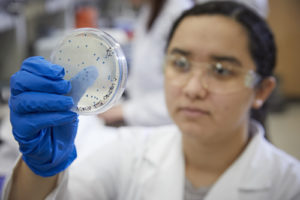A $1 million NSF grant has paved the way for what may be the first-ever community college to include gene editing curriculum technology.
In partnership with Christiana Care’s Gene Editing Institute, Delaware Technical Community College (Del Tech) has developed a unique curriculum that will include gene editing in two courses in the biological sciences program.
As part of the NSF grant, Del Tech also will hold a series of workshops to teach gene editing techniques to community college faculty across the U.S. The workshops will help faculty develop their own gene editing curriculum.
Gene editing is a way of making specific changes to the DNA of a cell or organism. An enzyme cuts the DNA at a specific sequence, and when this is repaired by the cell a change or “edit” is made to the sequence.
The new gene editing curriculum provides a real-world link, with neighboring industry, that can benefit Del Tech along with the local economy, educators say.
“This innovative curriculum combines the unique talents of Christiana Care’s world-renowned gene editing team with the teaching expertise of our instructors at Delaware Tech,” says Del Tech President Mark T. Brainard, J.D. “This program will provide a boost to biomedical research and enhance the workforce in Delaware and elsewhere.”
“Having the CRISPR Cas 9 gene editing tool brought into our courses has been a tremendous advantage for our students,” says John McDowell, Ph.D., faculty member who teaches biology and biotechnology at Del Tech. “Right here in Delaware they are able to gain access to the latest information and skills that are very rarely taught in an undergraduate level, especially at community colleges, that will position them for future education and the biomedical workforce.”
The curriculum is able to accommodate different instructional needs, which experts say is essential in keeping students up to speed with the various technologies and tools used in the gene editing industry.
“The curriculum can be expanded to accommodate any level of instruction, and that’s the beauty of it,” says Eric Kmiec, Ph.D., director of the Gene Editing Institute at Christiana Care. “Students are now using the second iteration of a gene editing laboratory exercise that we developed—the same reaction that we still use in our own research laboratory. It’s the basis for the new ‘gene editing on a chip technology,’ a cancer diagnostic tool that’s already been commercialized. It is very exciting that students carrying out this unique reaction in an educational format can see a direct application into the real world of cancer research.”
The Gene Editing Institute specializes in gene editing biomedical research in cancer and other inherited diseases, and is working in the same space with oncologists, genetic counselors, and patients.
Kristen Pisarcik, science educator at the Gene Editing Institute, serves as liaison for the program at Del Tech. “What is really cool about the program is that as soon as new techniques are discovered and advanced at the Gene Editing Institute, I can immediately transfer those discoveries into the community college curriculum,” she adds.
Material from a press release was used in this article.
- Students view AI with optimism, but women are at risk of being left behind - July 7, 2025
- 6 key cybersecurity hiring trends - July 3, 2025
- Digital innovation and human connection are reshaping higher ed - June 30, 2025
